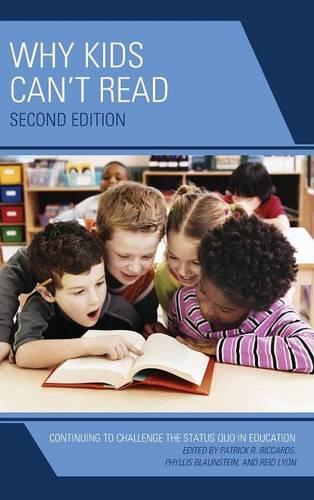
Why Kids Can't Read: Continuing to Challenge the Status Quo in Education
(Hardback, Second Edition)
Available Formats
Hardback, Second Edition
Published: 18th December 2014
Paperback, Second Edition
Published: 18th December 2014
Publishing Details
Why Kids Can't Read: Continuing to Challenge the Status Quo in Education
By (Author) Patrick R. Riccards
Edited by Phyllis Blaunstein
Edited by Reid Lyon
Bloomsbury Publishing PLC
Rowman & Littlefield Publishers
18th December 2014
Second Edition
United States
Classifications
Professional and Scholarly
Non Fiction
Educational: First / native language: Reading and writing skills
Educational administration and organization
Primary and middle schools
372.4
Physical Properties
Hardback
242
Width 152mm, Height 229mm
Description
Nearly forty percent of all fourth graders in this country cannot read at grade level, and this number rises to sixty percent for children coming from poor families. This gap in learning increases as students go through grade school and is a primary reason for school failure. Ironically, this problem comes even after comprehensive research demonstrates that nearly all children can learn to read if taught using proven-effective instruction. Here, the authors describe the principles of this research in language that non-educators can understand and educators can use. It discusses how to recognize whether the research on reading is being used appropriately, and if not, how to make that happen. Through the eyes of parents and educators who have succeeded in their own struggles to change the educational system, the book provides the reader with the tools and knowledge for transforming the way reading is taught in their children's classrooms. This book takes the reader step-by-step through an understanding of the research on reading and ways in which a single, determined person can make a difference in the learning ability of every student in our nation's schools. Part One is a series of chapters written by individuals who discuss what they experienced during these battles and what made them successful. Part Two is written by a series of experts who describe how they have overcome the challenges involved in creating widespread change in school systems. This second edition also includes information on Common Core State Standards, increased testing and accountability efforts, and related policy issues that directly impact how children learn to read. The appendix is filled with resources-people, places, sample tools, a glossary and bibliography to help the reader. Some key features of this book include: Easy to understand descriptions of research First-person stories of how they have helped teach their kids to read Clear understanding of scientifically based reading and how it can be applied to the classroom Summary of reading-related Common Core State Standards Sample tools for parent advocates Resource lists of government officials, organizations that can help with reading efforts
Reviews
This book has the potential to change an appalling statistic70%80% of poor minority children cannot read at grade level. This is a national and personal tragedy that cannot continue to exist. Blaunstein, Lyon, and Riccards lay out the facts, solutions, and tools to help parents work to solve this problem. Every parent should know these in order to make the changes needed to eradicate reading failure in our children. -- Quentin Lawson, executive director, National Alliance of Black School Educators
I am the parent of an 11 year old special needs child. She has had a number of problems learning to read. For a parent, navigating the education system can be extremely difficult and frustrating. Everything becomes personal, and the stakes are high. This book was so helpful to me. The resources are outstanding and, frankly, it is good to know we are not in this alone. I will recommend this book as an excellent source for other parents, teachers, and administrators. -- Cheryl Kravitz, parent
Families and parents know the relationship of reading to their childrens academic and long-term success. Many, however, are unfamiliar with the nuances of evaluating how well reading is taught in their childrens schools. The contributors have made a significant contribution to the tools parents have available to support their childrens reading instruction. Why Kids Cant Read articulates the challenges parents face with practical solutions and advice on effectively interacting with schools and teachers to support student learning. Parents, teachers, and policymakers will appreciate the no-nonsense stance and strategic resources included in this book. -- Brenda Lilienthal Welburn, executive director, National Association of State Boards of Education
Parents and teachers working together can be an unstoppable force in solving our childrens reading problems. This book will guide all who want to strive for a nation of readers. -- Robert Chase, past president of the National Education Association
Author Bio
Patrick R. Riccards is a nationally recognized strategist, writer, and speaker on school improvement and education issues. He is also the voice behind the award-winning Eduflack blog. Phyllis Blaunstein is a national leader in education policy and public engagement. She worked extensively with state boards of education to develop state policies to ensure an effective education for all children as the former executive director of the National Association of State Boards of Education, was an education policy fellow with the Institute for Education Leadership, and was a member of the regulations writing team for the first law that guaranteed the right to an education for children with disabilities, P.L. 94-142, the Education for All Handicapped Children Act. Reid Lyon is the chief executive officer of Synergistic Education Solutions. He was a research psychologist and chief of the Child Development and Behavior Branch within the National Institute of Child Health and Human Development at the National Institutes of Health. In that capacity, he was responsible for the direction and management of research programs in developmental psychology, cognitive neuroscience, behavioral pediatrics, reading and human learning, and learning disorders. He was also responsible for translating NIH scientific discoveries relevant to the development and education of children to Congress and other government agencies.
